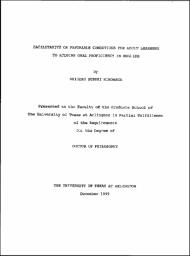
ATTENTION: The works hosted here are being migrated to a new repository that will consolidate resources, improve discoverability, and better show UTA's research impact on the global community. We will update authors as the migration progresses. Please see MavMatrix for more information.
Show simple item record
| dc.contributor.author | Hironaga, Shigeko Suzuki | |
| dc.date.accessioned | 2020-10-07T21:05:33Z | |
| dc.date.available | 2020-10-07T21:05:33Z | |
| dc.date.issued | 1999-12 | |
| dc.identifier.uri | http://hdl.handle.net/10106/29477 | |
| dc.description.abstract | Social interaction in the language classroom has been said to contribute to the acquisition of oral proficiency in a target language by presumably facilitating comprehension and learner production through negotiation of meaning. Since a great portion of interaction is initiated by teacher questions, numerous studies on questions have been conducted. The majority of these studies, however, fail to provide adequate explanations for the conditions or environments which result in successful or unsuccessful elicitation. The study investigated the relationship between input, interaction and learner production with a focus on internal and external factors to teacher questions. Factors such as form, function, topic of teacher questions, and wait time (WT) in post-solicitation were considered as internal factors. The external factors were the gender of an instructor, the setting of instruction, and the context of learning. A total of 36 hours of recorded classroom interaction with 14 subjects in Texas and in Japan were used for analysis. The findings of this study indicate that referential questions, personal topics, and longer WT result in longer learner production; whereas display questions, impersonal topics, and shorter WT result in shorter learner production. There are also significant interaction effects between function, topic, and WT. Other findings include the following: (1) there are significant differences between genders in the success rate of elicitation and mean word count of learner production, (2) the two genders differed significantly in the use of questions quantitatively and qualitatively and in the use of WT, and (3) the mean WC of spontaneous production is significantly greater than the mean WC of responses elicited by teacher questions. All significant findings were used to train teachers for an experimental study. The results demonstrated that the findings coupled with their incorporation by teachers who were carefully trained to implement them in the classroom improved classroom interaction. This study offers practical application for language pedagogy. Furthermore, it suggests that teacher questions be re-evaluated in light of external factors to discover the most successful social interaction in the language classroom. | en_US |
| dc.language.iso | en_US | en_US |
| dc.publisher | University of Texas at Arlington | en_US |
| dc.subject | Education | |
| dc.subject | Language | |
| dc.subject | Literature and linguistics | |
| dc.subject | Adult learners | |
| dc.subject | English | |
| dc.subject | Gender differences | |
| dc.subject | Oral proficiency | |
| dc.title | FACILITATIVE OR FAVORABLE CONDITIONS FOR ADULT LEARNERS TO ACQUIRE ORAL PROFICIENCY IN ENGLISH | en_US |
| dc.type | Dissertation | en_US |
| thesis.degree.department | Humanities | |
| thesis.degree.name | Doctor of Philosophy in Humanities | |
Files in this item
- Name:
- Facilitative or Favorable ...
- Size:
- 6.514Mb
- Format:
- PDF
- Description:
- PDF
This item appears in the following Collection(s)
Show simple item record


